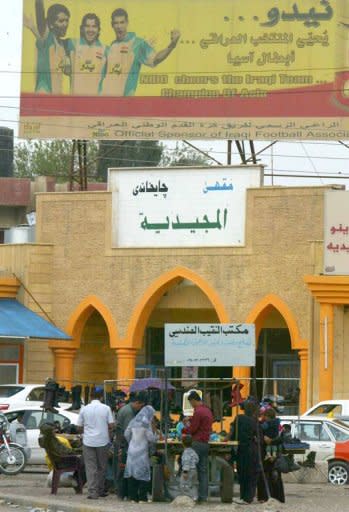Turkish minister's Kirkuk visit infuriates Iraq
Turkish Foreign Minister Ahmet Davutoglu visited the disputed northern Iraqi city of Kirkuk on Thursday without informing Baghdad, infuriating Iraq and bringing relations to a new low. Davutoglu made the side-trip to Kirkuk while on a visit to Iraqi Kurdistan, whose leaders have long called for the incorporation of the ethnically divided oil city in their autonomous region in the north, against strong opposition from Baghdad. Kirkuk province is part of a swathe of disputed territory in northern Iraq that along with oil contracts are the two main points of contention between Baghdad and the Kurdish regional government in Arbil. The Iraqi foreign ministry issued a statement saying that "it is not in the interest of Turkey or any other party to underestimate the national sovereignty and violate the rules of international relations and not comply with the most basic regulations in the relations of states and officials. "All of that was done without the knowledge or approval of the foreign ministry and without going to the official and diplomatic channels to organise this visit," it said. The foreign ministry statement also termed the visit "blatant interference in Iraq's internal affairs," and said that Turkey should be ready for "the results of this action" and its potential "negative effects on relations between the two countries." The Kurdish authorities too came in for criticism in the statement, which said: "We are surprised by the position of the government of the region, which facilitated the visit without the knowledge of the federal government and thereby violated its constitutional responsibilities." Local officials in Kirkuk said they had only learned at the last minute that Davutoglu was coming. "We were only aware of the visit half an hour before it started," said Rekan al-Saeed, the deputy governor of Kirkuk. "We look at this visit as a personal one with no diplomatic or political goal, as long as it has not been approved by official federal channels," Saeed said. Davutolgu visited leaders of Kirkuk's Turkmen community, with which Ankara has long had close ties, as well as religious and historical sites including the city's Ottoman cemetery. Turkmen Front head Arshad al-Salehi told AFP: "Turkmen should work to enhance relations with Turkey, and Shiites with Iran, and Sunnis with Gulf countries." The front's deputy leader, Ali Hashem Mukhtar Oglu, said Davutoglu was the highest-ranking Turkish official to visit the city in decades. Ties between Iraq and Turkey have been marred by a flurry of disputes this year. In July, Iraq warned Ankara against "any violations" of its territory and airspace, and instructed the foreign ministry to register a complaint at the UN Security Council, after Turkish jets bombed Kurdish rebels in Kurdistan. A few days earlier, Iraq called on Turkey to stop accepting "illegal" transfers of crude oil from Kurdistan, which an official from the region said had begun earlier in the month. In May, Davutoglu condemned a demonstration near Turkey's consulate in the southern Iraqi city of Basra, during which protesters burned Turkish flags after Turkey refused to hand over their fugitive vice president. Turkey has for months hosted Iraq's fugitive Sunni Arab vice president, Tareq al-Hashemi, who is wanted on charges of running a death squad and is being tried in absentia. In April, Iraqi Prime Minister Nuri al-Maliki said that Turkey was becoming a "hostile state" in the region, accusing its premier of interfering in internal Iraqi affairs. His remarks came after Turkish Prime Minister Recep Tayyip Erdogan accused Maliki's Shiite-led government of stoking sectarian tensions.




